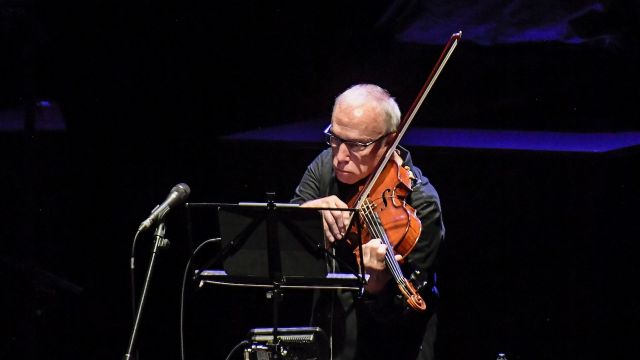Kronos: Five Decades
The first time I saw Kronos (I believe it was the 1992 Festival) I was awestruck by not only their playing but their attention to visual artistry. They were the first string quartet I had seen who employed lighting in creative ways. At that performance they played Steve Reich’s “Different Trains” as well as a Sculthorpe piece and I was transformed by the experience, totally immersed in a different reality for those few hours.
Opening the show this year with “Black Angels - Thirteen Images from the Dark Land” (1970) by George Crumb, violinist David Harrington quipped that they had only ever started a show once before with this piece; indeed it was tackling this work that inspired the founding of the ensemble. It is certainly challenging but mesmerizing nonetheless. Inspired by the Vietnam War, the work draws together a range of sounds including shouting, chanting, whistling, whispering, maracas, plus gongs and crystal glasses which are not only struck, but bowed. The three sections portray, in Crumb’s words, “a voyage of the soul”: “Departure” (fall from grace), “Absence” (spiritual annihilation), and “Return” (redemption). I have listened to the recording many times, but so much better to experience it live and supplemented by Brian H. Scott’s lighting design.
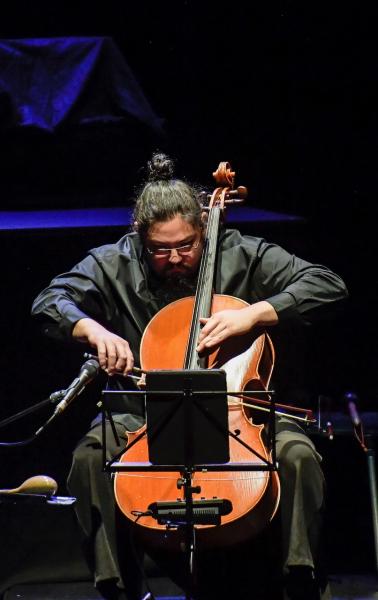
Next, an Australian premiere, was “ilektrikés rímes” (Electric Rhymes 2021) by New York-based, Serbian composer Aleksandra Vrebalov. This work was commissioned for the Kronos Quartet by Carnegie Hall and the David Harrington Research and Development Fund. A long-time collaborator with Kronos, the composer has 90 works to her name ranging from concert music and opera to music for modern dance and film. Kronos Quartet had suggested a project for younger composers who had grown up listening to them play “Black Angels” and this was Vrebalov’s inspiration for “ilektrikés rímes”. It is a meditative work and overlaying the live playing are recorded components of a northern Serbian chant in old Slavonic.
After intermission and a re-set of the stage, we were treated to the world premiere of “Beak” (2023) by Jon Rose & Hollis Taylor who were also attending the concert. “Beak” was composed for Kronos and it pairs the live musicians with recorded, nocturnal birdsong of the Australian pied butcherbird Cracticus nigrogularis. Accompanied by slides and video projected upstage of ghostly lemon scented gums, the moon in the night sky, and the bird itself, this composition combines the talents of Taylor and Rose. Taylor is a violinist/composer, zoömusicologist, and ornithologist and has recorded hundreds of hours of bird sounds, including nocturnal solo songs, where one bird may sing up to seven hours of music. Her partner Jon Rose developed the concept of The Relative Violin and is known for innovation in the fields of new instrument design, environmental performance, new instrumental techniques, radiophonic works, and the development of inter-active electronics. In a creative ‘discussion’, the music sometimes mimics the birdsong, or complements it, or is inspired in a tangential way.
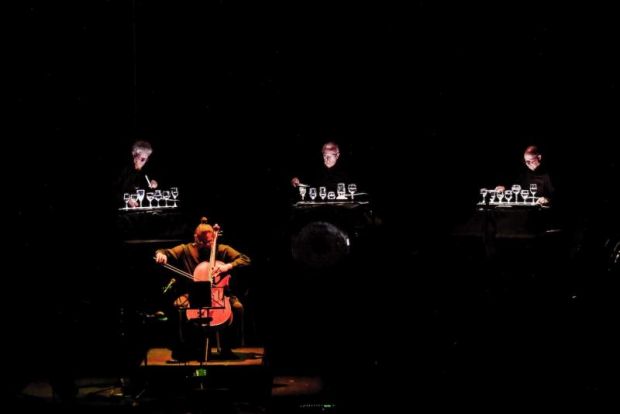
Kronos Quartet have developed and established 50 For The Future, a free library of fifty contemporary works designed to guide musicians in developing and honing the skills required for the performance of 21st-century repertoire. Harrington posed this: “What would happen if we could, through our years of working with hundreds of composers from many places, make a body of incredibly interesting, fun music that could serve the next generation as a launching pad to a world of discovery?”. There are scores, recordings, and more for anyone to access.
Missy Mazzoli was dubbed “Brooklyn’s post-millennial Mozart” by Time Out New York and her “Enthusiasm Strategies” (2019) was written for 50 For The Future and there is a recording of Kronos playing it on the website. On stage, the musicians were bathed in a gentle turquoise light and the music seemed to float over the auditorium, occasionally rash and bold, or contemplative and almost below hearing. Mazzoli describes her work thus: a cascade of natural harmonics collapses into an ecstatic chorale, which then evaporates into silence.
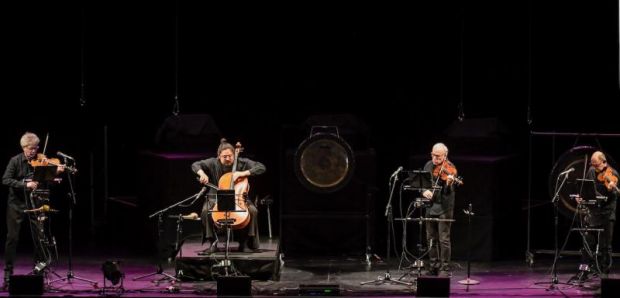
Lauded Polish composer Krzyzstof Penderecki died in 2020 and has left a legacy of four operas, eight symphonies and other orchestral pieces, a variety of instrumental concertos, choral settings of mainly religious texts, as well as chamber and instrumental works, at least eleven documentary and feature films (including six pieces for Stanley Kubrick's The Shining) plus twenty-five animated films for adults and children. “Quartetto per archi” (Quartet for strings) was written in 1960 and for this performance, the entire Kronos crew face upstage. This is a remount of the Quartet’s first ever-staged production (designed by Larry Neff), Live Video (1986). As they play, the score is writ large on a screen and the video traverses horizontally as the ‘fearlessly inventive’ avant garde composition is played.
Lastly, the group were joined by award-winning, Iranian singer, composer, and cultural activist Mahsa Vahdat. In a series of spin-tingling vocal works, some based on the writings of Rumi, Ms Vahdat is quite the phenomenon and particularly when matched with Kronos Quartet. Women have been banned from singing in public, and especially in front of male audiences, since the Islamic revolution in 1979. The Vahdat sisters (Mahsa and Marjan) were filmed for a controversial movie about the underground music scene in Tehran and the image of them singing from a rooftop sans Hijab was hailed as an image of freedom by young women in Iran and elsewhere.
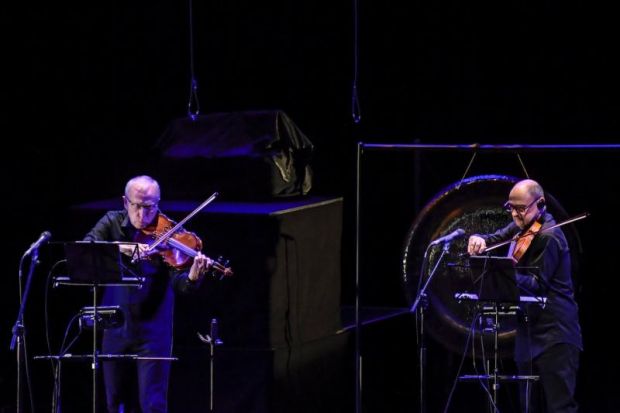
The entire concert was one of the premier events of this Festival and, just like the other times I have been fortunate to see Kronos Quartet, it was a transformative experience. Now in their fiftieth year of existence, what will be next?
Lisa Lanzi
Photographer: Roy VanDerVegt
Subscribe to our E-Newsletter, buy our latest print edition or find a Performing Arts book at Book Nook.

